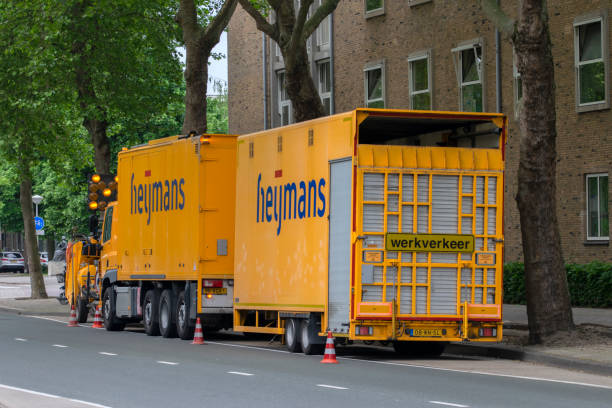Introduction
The word Afruimwagens may not be familiar to everyone, but in agriculture and industrial logistics, it represents innovation, efficiency, and reliability. These specially designed wagons simplify the process of transporting, unloading, and managing goods. Whether on a farm during harvest season or in a warehouse moving heavy materials, Afruimwagens have become indispensable.
This detailed guide explores the origins, applications, advantages, and innovations surrounding Afruimwagens, giving you a complete perspective on why they are crucial in today’s fast-paced world.
Understanding Afruimwagens
What Does Afruimwagens Mean?
Afruimwagens is a Dutch term often associated with unloading wagons. These vehicles are designed to make the transport and discharge of crops, materials, or industrial goods easier. While they were once simple carts pulled by animals, modern are engineered with advanced technology for large-scale operations.
Core Purpose of Afruimwagens
-
Collecting harvested crops efficiently.
-
Transporting goods over rough terrain.
-
Unloading materials without manual strain.
-
Supporting sustainability through modern designs.
Historical Background of Afruimwagens
Agricultural communities in Europe first developed as a response to labor-intensive harvesting. Farmers needed tools that could speed up collection while minimizing damage to crops. Over time, as technology advanced, transformed from wooden carts to hydraulic-powered wagons capable of handling tons of produce in one trip.
By the late 20th century, had already become a standard on large farms, and now in 2025, they are widely used across farming, construction, and logistics sectors.
Why Afruimwagens Are Essential in Modern Agriculture
Faster Harvesting Cycles
Crops like potatoes, grains, and sugar beets must be harvested quickly to avoid spoilage. enable rapid collection, reducing losses.
Labor Efficiency
Instead of dozens of workers manually moving produce, one Afruimwagen can transport loads in minutes, cutting labor costs dramatically.
Protecting Crop Quality
With smooth unloading systems, these wagons prevent bruising and damage, ensuring higher quality produce reaches markets.
Larger Scale Operations
Commercial farms covering hundreds of hectares rely on to keep pace with demand, making them a critical investment.
Types of Afruimwagens in 2025
1. Basic Afruimwagens
Affordable, simple models for small farms and limited operations.
2. Hydraulic Afruimwagens
Equipped with advanced hydraulic systems that allow controlled unloading. Perfect for delicate crops like fruits and vegetables.
3. High-Capacity Afruimwagens
Designed for large-scale farms and construction projects, these can carry bulk loads of crops, soil, or gravel.
4. Multi-Functional Afruimwagens
Adaptable wagons used not just in agriculture but also in logistics and factory operations.
5. Smart Afruimwagens
The newest generation features GPS tracking, smart unloading mechanisms, and AI-driven monitoring for precise efficiency.
Features That Make Afruimwagens Stand Out
-
Durability: Built from strong steel and advanced alloys.
-
Variety in Size: Small-scale units to industrial-scale wagons.
-
Hydraulic Power: Smooth unloading prevents crop damage.
-
Eco-Friendly Options: Electric-powered versions for sustainability.
-
Customization: Attachments and covers for specific farming needs.
Afruimwagens Beyond Agriculture
While farms remain the largest users of , their versatility makes them valuable across multiple industries:
Construction
Transporting sand, stones, and building materials with reduced labor and time.
Warehousing and Logistics
Moving heavy goods across large storage areas efficiently.
Manufacturing
Carrying raw materials or finished products between production units.
Benefits of Investing in Afruimwagens
-
Higher Productivity – Faster collection and transport boost overall efficiency.
-
Cost Savings – Reduced dependence on manual labor lowers expenses.
-
Worker Safety – Minimizes the risks of lifting and carrying heavy loads.
-
Eco-Conscious – Modern models integrate sustainable technologies.
-
Long-Term Value – Sturdy construction ensures longevity with proper care.
Choosing the Right Afruimwagens
When selecting Afruimwagens, businesses should consider:
-
Purpose of Use – Farming, construction, or logistics?
-
Load Capacity – Match wagon size to daily operational needs.
-
Terrain – Choose heavy-duty options for uneven ground.
-
Technology Level – Decide between standard or smart hydraulic features.
-
Budget and ROI – Factor in cost savings over long-term use.
Maintenance Tips for Afruimwagens
To ensure Afruimwagens last for years:
-
Inspect wheels and hydraulics regularly.
-
Clean wagons after each use to avoid rust.
-
Lubricate moving parts to reduce wear.
-
Store under covered areas to protect from weather.
Latest Innovations in Afruimwagens (2025 Update)
The year 2025 has brought exciting technological updates to Afruimwagens:
-
Self-Driving Wagons – Automated navigation for farms and factories.
-
Solar-Powered Models – Energy-efficient wagons for eco-friendly farming.
-
Smart Sensors – Track crop weight, moisture, and wagon performance.
-
AI-Powered Logistics – Intelligent unloading systems to save time.
The Future of Afruimwagens
With sustainability and automation at the forefront, the future of Afruimwagens looks promising. Expect innovations such as AI-based fleet management, fully electric-powered wagons, and integration with robotic harvesters. These advancements will make Afruimwagens not just tools but essential components of the smart farms and industries of tomorrow.
Conclusion
Afruimwagens are no longer just simple wagons—they are symbols of efficiency, progress, and sustainability. From traditional farms to modern factories, they enhance productivity, reduce costs, and ensure safe handling of goods.
As industries continue to adopt automation and eco-friendly solutions, Afruimwagens will remain at the heart of innovation. For anyone involved in agriculture, logistics, or construction, investing in Afruimwagens is an investment in a smarter, more sustainable future.
